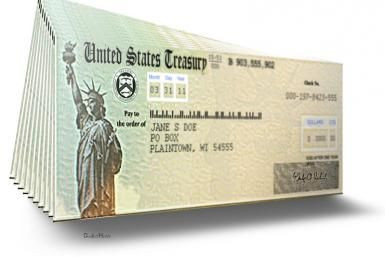Coronavirus Stimulus Checks: Glitches, No Deposit And More Problems Plague First Wave Direct Payments

KEY POINTS
- Recipients have complained on social media of various glitches and problems plaguing the IRS' stimulus web tool and the first wave of checks being deposited
- Problems have included the web tool crashing from traffic, checks being deposited into the wrong accounts and tax services taking service fees out of the stimulus check
- Some have reported checks being sent to the accounts of the recently deceased, causing further confusion among some recipients
As the Internal Revenue Service began sending stimulus checks to help Americans affected by the COVID-19 pandemic, but some recipients said Thursday their checks went to the wrong bank accounts while other checks were sent to accounts belonging to the recently deceased. Others have reported glitches related to several popular tax programs that kept them from receiving their checks.
The apparent root of the problems has been the IRS’ Get My Payment web tool that recipients could use to track the stimulus checks. However, complaints began flooding the IRS on Wednesday as users complained of various glitches or being unable to enter the necessary information.
Yo @IRSnews your get my payment site is a joke. Don't launch something that's not going to work for 95% of the people trying to use it. pic.twitter.com/smXUT8AMuX
— Brian Buchanan (@The937Nerd) April 15, 2020
The IRS 'Get my Payment" site keeps going down for technical difficulty. Also the refund or owe question needs a third option of "neither" for folks paying final amount to zero. there is no way to contact IRS on the site
— Barbara T Warthan (@BTWarthan) April 15, 2020
Some users who managed to get into the tool said on social media their stimulus check was sent to either an inactive accouns or an account belonging to someone else. Despite the problems, some banks reportedly told recipients there was nothing they could do.
You sent my check to the wrong account number! I've had my account for years. Bank says there's nothing they can do. Now what? please advise. pic.twitter.com/UT8Nv5RfzZ
— Lydia Cooper (@OKIOU1) April 16, 2020
“You’re jubilant because you’ve been waiting to get that money. And you look down and the bank account number is not even close,” Lansing, Michigan, resident Chris Rodriguez told USA Today.
Another problem being reported by recipients is that either the wrong amount or no money was dropped into their accounts at all. The U.S. Treasury Department and other experts said this was because the IRS was unable to get direct deposit information from various tax services, such as H&R Block and TurboTax.
Consumer law expert Vijay Raghavan told the Washington Post the IRS sent the stimulus out to the tax services first because it had “temporary bank accounts” on file belonging to the services. Raghavan said this was due to either people getting an advance on their tax returns from employers or because they had the service fee taken out of their 2019 returns. This meant the tax services saw the stimulus money first, took out the service fee, and distributed the remaining money to customers.
The Treasury Department said it was aware of the situation and working to amend it, but did not provide a timeline on how long it could take to fix.
Arguably the oddest problem is that of money going to the recently deceased, which was reported by people on social media, including Rep. Thomas Massie of Kentucky, who said a personal friend brought the issue to his attention.
Ok this is insane, but just the tip of the iceberg. This is a direct text to me from a friend. I called to confirm this actually just happened. pic.twitter.com/GBRPcmYMXW
— Thomas Massie (@RepThomasMassie) April 15, 2020
Other people have shared their confusion over the stimulus checks on Twitter and whether or not they can keep the money.
I know someone who received their $1,200 #StimulusCheck today & also received $1,200 for their deceased spouse who passed in early 2018, which was clearly indicated deceased on their 2018 tax return.
— Scott Salaske (@scottsalaske) April 15, 2020
Is the government that desperate for people to spend money?#StimulusChecks
Nina Olson, founder of the Center for Taxpayer Rights and former taxpayer advocate at the IRS, said these people can keep the money. She told USA Today the stimulus checks were based on taxpayers’ 2019 or 2018 returns, depending on how early they filed in 2020, and anyone with a family member who died during that time was still eligible to receive the money.
“That was really consciously written into the law,” Olson said. “It's rough justice. They're using the data that's available to get money into the system. They know in advance that some payments will go out that shouldn't go out.”
Malcolm Sparrow, who served on the oversight panel for the American Recovery and Reinvestment Act under President Barack Obama, said this isn’t the first time something like this has happened. He said that out-of-date data about who had passed away in the last two years is a possible reason why those people weren’t filtered out.
“So that's one potential explanation, that it's just out of date or inaccurate death records being transferred from one agency to another,” Sparrow said. “The other potential explanation is a lot more worrying: that other people are exploiting the identities of the dead to file false claims.”
He said systems that rely heavily on electronic submissions and payments open “the door for massive computerized fraud.”
Senate Finance Committee Chairman Chuck Grassley’s office said it was looking into the situation.
© Copyright IBTimes 2025. All rights reserved.





















